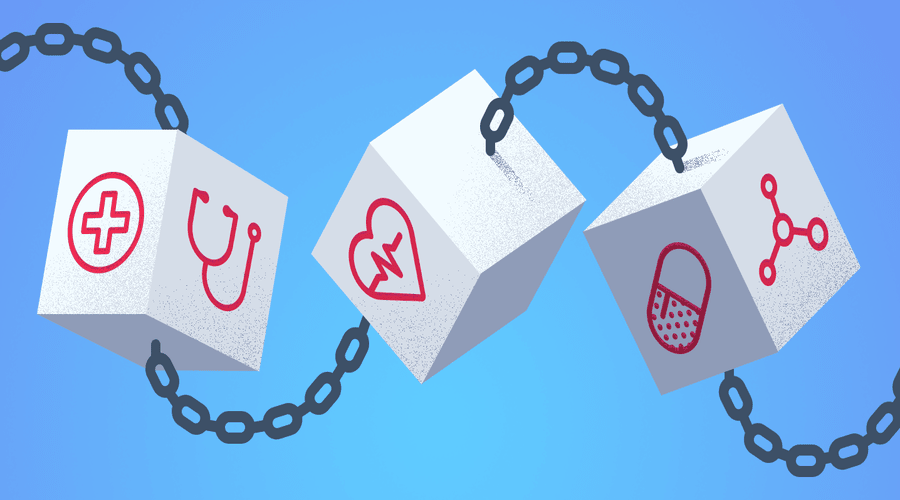Introduction
The healthcare industry is constantly seeking ways to improve efficiency, security, and patient care. One technology that holds immense promise in achieving these goals is blockchain. Blockchain technology, most commonly known as the underlying technology behind cryptocurrencies like Bitcoin, has the potential to revolutionize the healthcare sector. In this article, we will explore the fundamentals of blockchain technology and its applications in healthcare.
What is Blockchain Technology?
Blockchain is a decentralized and distributed digital ledger that records transactions across multiple computers. Each transaction, or block, is linked to the previous one through cryptographic hashes, creating an immutable chain of data. The decentralized nature of blockchain eliminates the need for intermediaries, such as banks or governments, and ensures transparency, security, and data integrity.
Applications of Blockchain in Healthcare
Blockchain technology can be applied to various areas in healthcare, ranging from medical records management to drug supply chain tracking. One of the significant applications is the secure sharing of electronic health records (EHRs). By storing EHRs on a blockchain, patients, doctors, and other authorized parties can access and update medical records securely and efficiently, reducing redundancies and medical errors.
Benefits of Blockchain in Healthcare
Implementing blockchain technology in healthcare brings several benefits. Firstly, it enhances data security and privacy by utilizing encryption techniques and granting patients more control over their data. Additionally, it streamlines administrative processes, reduces healthcare fraud, and improves interoperability between different healthcare systems. Blockchain also has the potential to facilitate medical research and clinical trials by securely sharing data across institutions.
- Enhanced Data Security: Blockchain provides a secure and tamper-resistant platform for storing and sharing sensitive healthcare data. The decentralized nature of blockchain ensures that data is not stored in a single location, reducing the risk of unauthorized access or data breaches.
- Improved Interoperability: Blockchain enables seamless data exchange and interoperability between different healthcare systems and providers. It eliminates the need for intermediaries and facilitates secure and efficient sharing of patient information, leading to better coordination of care and improved patient outcomes.
- Efficient Claims and Billing Processes: Blockchain streamlines administrative processes by automating and digitizing claims and billing procedures. It eliminates the need for manual reconciliation and reduces the administrative burden, resulting in faster claim processing and reduced healthcare fraud.
- Transparent Supply Chain Management: Blockchain can revolutionize the management of the pharmaceutical supply chain by providing an immutable record of every transaction, from drug manufacturing to distribution. This transparency helps in preventing counterfeit drugs, ensuring product authenticity, and improving patient safety.
- Patient-Controlled Data: Blockchain empowers patients to have greater control over their healthcare data. Through blockchain-based platforms, patients can securely access and share their medical records, grant permissions to healthcare providers, and maintain a comprehensive and up-to-date health history.
- Streamlined Clinical Trials: Blockchain technology can simplify and accelerate the clinical trial process by securely storing and sharing trial data across multiple stakeholders. This enables efficient collaboration, enhances data integrity, and potentially expedites the development of new treatments and therapies.
- Improved Research and Analytics: Blockchain facilitates the sharing of anonymized patient data for medical research while maintaining privacy and data security. Researchers can access a larger pool of diverse data, leading to more accurate analyses, better insights, and advancements in medical research.
- Reduced Healthcare Costs: By eliminating intermediaries, reducing administrative complexities, and preventing fraud, blockchain has the potential to reduce healthcare costs. The streamlined processes and improved efficiency can lead to cost savings for healthcare providers, insurers, and patients.
- Traceability and Auditability: Blockchain’s transparent and immutable nature allows for traceability and auditability of healthcare transactions. This is particularly beneficial in cases of adverse events, medical errors, or drug recalls, as the entire transaction history can be easily accessed and verified.
- Data Privacy and Consent Management: Blockchain technology provides patients with more control over their data privacy and consent management. Smart contracts and encryption techniques enable patients to specify who can access their data and under what conditions, ensuring compliance with privacy regulations like GDPR.
Implementing blockchain technology in healthcare holds immense potential to improve efficiency, security, and patient care. By leveraging the benefits of blockchain, the healthcare industry can overcome existing challenges and pave the way for a more patient-centric and interconnected healthcare ecosystem.

Challenges and Limitations
While blockchain technology offers significant benefits, it also faces several challenges and limitations when it comes to its implementation in the healthcare industry. These include:
- Scalability: Blockchain networks face scalability issues as the number of transactions increases. The current technology struggles to handle the large volume of transactions required by the healthcare sector, potentially causing delays and inefficiencies.
- Integration Complexity: Integrating blockchain with existing healthcare systems can be complex and requires careful planning. Legacy systems may not be compatible with blockchain technology, requiring significant investment and effort to ensure seamless integration.
- Regulatory and Legal Considerations: The healthcare industry is highly regulated, and implementing blockchain technology must comply with various legal and regulatory frameworks. Ensuring compliance with patient privacy regulations, data protection laws, and interoperability standards poses challenges that need to be addressed.
- Standardization: The absence of standardized protocols and frameworks for blockchain in healthcare hinders widespread adoption. Establishing industry-wide standards is crucial to ensure interoperability, data consistency, and effective collaboration among stakeholders.
- Lack of Technical Expertise: Blockchain technology requires specialized technical knowledge for its implementation, maintenance, and security. The scarcity of skilled professionals in this field can pose challenges for healthcare organizations looking to adopt blockchain solutions.
- Energy Consumption: Blockchain networks, especially those based on proof-of-work consensus mechanisms, consume significant amounts of energy. This poses environmental concerns and may deter organizations aiming for sustainability.
- User Experience and Adoption: Transitioning to blockchain-based systems may require changes in workflows and user interfaces, potentially affecting the user experience. Ensuring a smooth transition and user adoption of blockchain solutions in healthcare can be a challenge.
- Costs and Return on Investment: Implementing blockchain technology in healthcare involves significant upfront costs, including infrastructure development, staff training, and system integration. Organizations need to carefully evaluate the return on investment and assess the long-term benefits of adopting blockchain solutions.
- Data Privacy and Confidentiality: While blockchain ensures data security, the pseudonymous nature of transactions can present challenges related to data privacy and confidentiality. Combining blockchain data with external sources or re-identifying patients based on blockchain information needs careful consideration.
- Limited Industry Awareness: Despite the potential benefits, there is still limited awareness and understanding of blockchain technology within the healthcare industry. Raising awareness, promoting education, and fostering collaboration between technology providers and healthcare stakeholders are essential for widespread adoption.
Addressing these challenges and limitations requires collaborative efforts from healthcare organizations, technology providers, regulators, and policymakers. Overcoming these hurdles will unlock the full potential of blockchain technology in healthcare and drive innovation in the industry.
Privacy and Security in Blockchain
Blockchain provides a high level of privacy and security, but it’s essential to understand its nuances. While transactions on a blockchain are pseudonymous, meaning users are identified by their public keys rather than personal information, confidentiality concerns may arise when combining blockchain data with external sources. Advanced encryption techniques and smart contract audits are crucial in safeguarding sensitive healthcare information.
Case Studies
Several real-world examples highlight the potential of blockchain in healthcare. One notable case is the partnership between Guardtime and eHealth Estonia, where blockchain technology secures over one million health records, ensuring data integrity and preventing unauthorized access. Another example is MedRec, a blockchain-based platform developed by MIT, which allows patients to access and control their medical records securely.
Future Potential
The future of blockchain in healthcare holds significant promise. As the technology evolves and matures, we can expect increased scalability, improved interoperability, and enhanced privacy features. Blockchain may facilitate the development of personalized medicine, enable precision health analytics, and drive innovation in areas such as telemedicine, medical research, and supply chain management.
Conclusion
Blockchain technology has the potential to transform the healthcare industry by addressing key challenges related to data security, privacy, and interoperability. Its applications in electronic health records, supply chain management, and clinical research are already showing promising results. While challenges and limitations exist, ongoing developments and collaborations within the healthcare ecosystem are paving the way for a more decentralized and patient-centric healthcare system.
Frequently Asked Questions
- Q: How does blockchain technology ensure data security in healthcare? A: Blockchain utilizes encryption techniques and decentralized storage to enhance data security in healthcare, reducing the risk of unauthorized access or tampering.
- Q: Can blockchain improve the interoperability of healthcare systems? A: Yes, blockchain has the potential to improve interoperability by securely sharing data between different healthcare systems and reducing data silos.
- Q: What are the limitations of implementing blockchain in healthcare? A: Some limitations include scalability challenges, integration complexities with existing systems, and regulatory considerations that need to be addressed for widespread adoption.
- Q: Are there any real-world examples of blockchain implementation in healthcare? A: Yes, examples include the partnership between Guardtime and eHealth Estonia and the MedRec platform developed by MIT.
- Q: What does the future hold for blockchain in healthcare? A: The future looks promising, with potential advancements in scalability, privacy features, and the facilitation of personalized medicine and precision health analytics.





